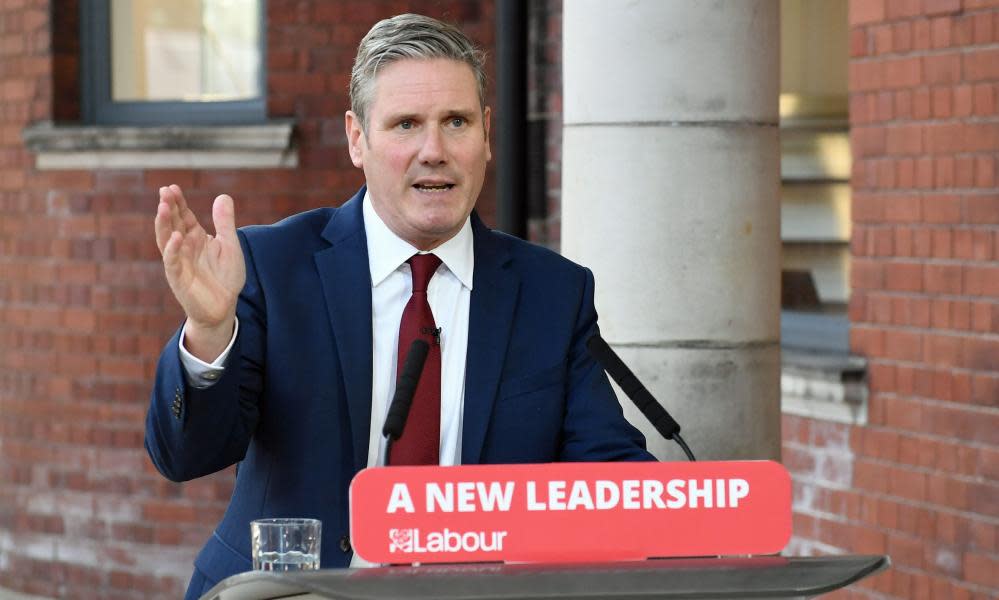Keir Starmer’s message to the Labour party: I am not Jeremy Corbyn

Keir Starmer’s first party conference speech as leader had been pitched in advance as a moment to set out his values and vision – which sceptics of his leadership have grumbled are hard to discern.
Tuesday’s speech at an arts centre in Doncaster fulfilled that brief: Starmer spoke about, “a country that embodies the values I hold dear. Decency, fairness, opportunity, compassion and security”.
But the much stronger message woven though the speech was a different one: I am not Jeremy Corbyn.
It began even before the Labour leader had said a word, as he was introduced by the Jewish former Labour MP Ruth Smeeth, who has been a leading critic of her party’s record on antisemitism.
Smeeth talked about the “visceral racism” directed at Jewish colleagues, who had been “bullied out” of the party – and underlined Starmer’s determination to take a different approach.
When Starmer took to the podium, he didn’t mention his immediate predecessor by name, instead making reference to the three Labour leaders who have won elections since the war: Attlee, Wilson and Blair.
In what appeared to be a veiled criticism of the Corbyn leadership’s political nostalgia – for wholesale nationalisation, sectoral collective bargaining and the banners and brass bands of the Durham miner’s gala – Starmer said the message from all those election-winning leaders was, “don’t look back, look to the future”.
“What we say at the next general election isn’t written yet. But it will be rooted in Labour values. It won’t sound like anything you’ve heard before. It will sound like the future arriving,” he said.
He swatted away the idea, promulgated by Corbyn himself in an Observer article after December’s defeat, that despite losing scores of seats, Labour had “won the arguments and rewritten the terms of political debate”.
By contrast, Starmer told his online audience: “Let’s be blunt. Let’s be brutally honest with ourselves. When you lose an election in a democracy, you deserve to. You don’t look at the electorate and ask them: “what were you thinking?” You look at yourself and ask: “what were we doing?”
And he rejected another central element of Corbyn’s playbook, too – the determination to avoid personal attacks on the Tories.
“They go low, we go high” was a strongly-held principle for Corbyn. But Starmer’s team believe the contrast between their man and the prime minister is one that can only benefit Labour – particularly after six months of botched handling of the pandemic.
“This is the big difference between the prime minister and me: while Boris Johnson was writing flippant columns about bendy bananas, I was defending victims and prosecuting terrorists. While he was being sacked by a newspaper for making up quotes, I was fighting for justice and the rule of law,” Starmer said.
There was also a jibe at what Corbyn’s critics sometimes claimed was his ambivalence about actually winning a general election.
“It’s time to get serious about winning. That means we have to change, and that’s what we’re doing,” he said – adding, as if to hammer the point home, “this is a party under new leadership”.
That appeared somewhat different to the tone during his leadership campaign, when to placate Corbyn’s army of leftwing supporters, Starmer signed up to 10 “pledges,” which included a wholesale adoption of much of the 2019 Labour platform.
There was little or no policy on view on Tuesday. Unlike Corbyn, who faced the imminent threat of a general election throughout much of his leadership, Starmer has the luxury of at least another four years to make his case – and party strategists see little benefit in showing their cards now.
Instead, he signalled his intention to continue attacking the government over its incompetence – Labour’s central, simple message, pasted into every press release. Another Covid lockdown, Starmer said, would be “a sign of government failure, not an act of God”.
Perhaps the only topic where some continuity between Corbyn’s Labour and Starmer’s was discernible was a deeply ironic one: Brexit.
Back in 2018, Corbyn was lambasted by many in his party for saying a Labour government would go ahead and implement the result of the referendum.
That stance resulted not just from Corbyn’s instinctive Eurosceptism, but from fears among some in his top team about the electoral impact in Labour heartland seats of ignoring the Brexit vote.
Starmer’s was among the voices urging Corbyn towards the position ultimately adopted for the general election last year, of promising another referendum. But since December’s crushing defeat, Starmer too has regarded Brexit as a done deal (as indeed, since 31 January, it is).
Corbyn and his close allies could have been excused for raising a wry eyebrow at their laptops, as Starmer insisted, “let me be absolutely clear. The debate between leave and remain is over. We’re not going to be a party that keeps banging on about Europe.”


